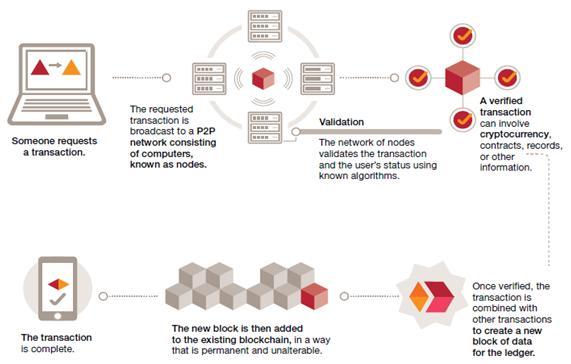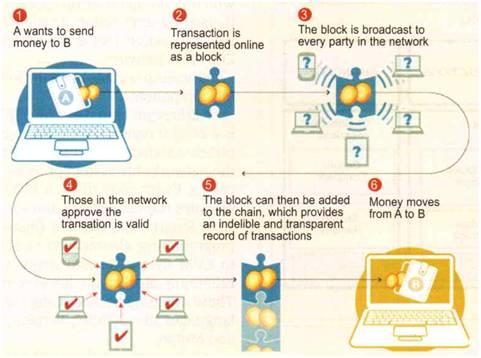Blockchain Technology: 5 Key Advantages and Disadvantages
Advertisement
Introduction: A blockchain is a peer-to-peer distributed ledger that is cryptographically secure, append-only, immutable, and updated only via consensus or agreement among peers.Blockchain is a digital decentralized ledger which keeps record of all transactions that have taken place across a peer-to-peer network. Its records are stored securely across a number of interconnected systems. As there is no single point of vulnerability, blockchain technology is resilient.
Each block is uniquely connected to its previous blocks via a digital signature which makes it impossible to change any record without affecting the previous records. This renders the information tamper proof. Blockchain technology allows its participants to transfer assets across the internet without the need for a centralized third party.
-
Example:

Types of Blockchain
Blockchain networks can be divided into public and private networks based on who is authorized to participate.
- Public: There are no restrictions on the number of people joining the network, and it operates in a decentralized, open environment. It is similar to the internet.
- Private: It operates within the confinement defined by a controlling entity. It is similar to an intranet.
How Blockchain Works
The figure below depicts the working of blockchain technology, and the subsequent figure depicts the money transfer process through a blockchain network.
As shown, Blockchain works by validating transactions through a distributed network in order to create a permanent, verified, and unalterable ledger of information.

Advantages of Blockchain Technology
Following are some of the benefits of Blockchain technology.
- Shared Ledger: It is an append-only distributed system shared across the business network. Hence it is resilient as there is no single point of failure.
- Consensus: A transaction is only committed when all parties agree to a network-verified transaction.
- Provenance: The entire history of an asset is available over a blockchain. This decreases the chance of fraud.
- Immutability: Records are indelible and cannot be tampered with once committed to the shared ledger. Hence this makes all the information trustworthy.
- Finality: Once a transaction is completed over a blockchain, it can never be reverted back.
- Smart contracts: Code is built within a blockchain which computers/nodes execute based on a triggering event.
- Security: Information is secured using cryptography.
Disadvantages of Blockchain Technology
Following are some of the drawbacks challenges of Blockchain technology.
- A transaction is dependent on multiple intermediaries and their presence. This increases the cost and complexity of the transaction.
- Regulation is the biggest challenge for non-fiat currency as the rate of technical innovation is faster than regulations.
- Scalability is another limitation due to the size of the public blockchain.
- Capacity is another concern as in order to have a dense network, a big number of tracks are needed. The problem here is that each of these tracks must be rooted in the blockchain.
- Blockchains like Bitcoin consume enormous amounts of electricity for mining, raising environmental and sustainability concerns.
- Different blockchain platforms often operate in silos and lack seamless interoperability, complicating cross-chain communication and asset transfers.
- Compared to traditional systems like Visa or Mastercard, blockchain networks often have slower transaction confirmation times, especially during network congestion.
Conclusion: Blockchain technology represents a revolutionary approach to data management, offering transparency, decentralization, enhanced security and efficiency in various applications; from finance to supply chains. Its advantages, such as immutability, peer to peer transactions and reduced reliance on intermediaries, make it a promising innovation for the digital era. However, challenges like scalability, high energy consumption, regulatory uncertainty and technical complexity still hinder its widespread adoption. As the technology matures and solutions to these issues evolve, blockchain has the potential to reshape industries while demanding responsible implementation and continuous innovation.
Advertisement
 RF
RF



